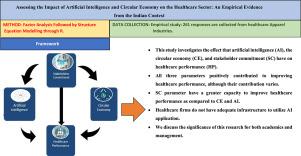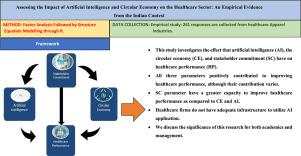Assessing the impact of artificial intelligence and circular economy on the healthcare sector: An empirical evidence from the Indian context
IF 10
1区 环境科学与生态学
Q1 ENGINEERING, ENVIRONMENTAL
引用次数: 0
Abstract
The Indian healthcare system is dealing with several challenges, including biological waste, transportation as well as logistics of life-saving medications, and inadequate infrastructure. Stakeholders must properly address these challenges to enhance the performance of the healthcare sector. Literature seeks stakeholder commitment, willingness to embrace artificial intelligence and the principles of the circular economy as possible solutions to the challenges. So this study considers four parameters, i.e., stakeholder commitment, circular economy, artificial intelligence, and healthcare performance. It ascertains each parameter’s (stakeholder commitment, circular economy, and artificial intelligence) contribution to healthcare performance. In addition, it determines whether a relationship exists between the four parameters. Artificial intelligence supports the healthcare sector by providing better inventory management, customer–supplier relationships, and efficient logistics service. This improves the quality of services. A circular economy ensures the reuse of leftover healthcare products, and recycling and ensures sustainability. This lowers the cost for the firms. This study was conducted empirically. Initially, we prepare a questionnaire and collect responses from healthcare firm stakeholders. A total of 261 responses are recorded, and these datasets are analyzed by R. A psych package is used for the data analysis. SEMinR package is used for the development of measurement and structural models. The research finding represents that all three parameters contribute to improving healthcare performance. Stakeholder commitment ( = 0.323) is the major driving force. Stakeholders prioritize implementing circular economy principles ( = 0.247) above artificial intelligence ( = 0.122). However, the potential capacity of artificial intelligence ( = 0.207) prevails over that of the circular economy ( = 0.167) when these two are compared. The comparison shows that Indian healthcare firms lack the necessary infrastructure to implement artificial intelligence, while they implement circular economy practices on a much wider scale.


评估人工智能和循环经济对医疗保健部门的影响:来自印度背景的经验证据
印度的医疗保健系统正在应对一些挑战,包括生物废物、救命药物的运输和物流,以及基础设施不足。利益相关者必须妥善应对这些挑战,以提高医疗保健部门的绩效。文献寻求利益相关者的承诺和意愿,将人工智能和循环经济原则作为应对挑战的可能解决方案。因此,本研究考虑了四个参数,即利益相关者承诺、循环经济、人工智能和医疗绩效。它确定了每个参数(利益相关者承诺、循环经济和人工智能)对医疗保健绩效的贡献。此外,它还确定了四个参数之间是否存在关系。人工智能通过提供更好的库存管理、客户-供应商关系和高效的物流服务来支持医疗保健行业。这提高了服务质量。循环经济确保剩余医疗保健产品的再利用,循环利用并确保可持续性。这降低了公司的成本。本研究采用实证方法。首先,我们准备了一份调查问卷,并收集来自医疗保健公司利益相关者的回应。共记录了261个回答,这些数据集由r进行分析。数据分析使用心理软件包。semr包用于开发测量和结构模型。研究结果表明,这三个参数都有助于提高医疗保健绩效。利益相关者承诺(β = 0.323)是主要驱动力。利益相关者优先考虑实施循环经济原则(β = 0.247),而不是人工智能(β = 0.122)。然而,人工智能的潜在容量(β = 0.207)优于循环经济的潜在容量(β = 0.167)。比较表明,印度医疗保健公司缺乏必要的基础设施来实施人工智能,而他们在更广泛的范围内实施循环经济实践。
本文章由计算机程序翻译,如有差异,请以英文原文为准。
求助全文
约1分钟内获得全文
求助全文
来源期刊

Journal of Cleaner Production
环境科学-工程:环境
CiteScore
20.40
自引率
9.00%
发文量
4720
审稿时长
111 days
期刊介绍:
The Journal of Cleaner Production is an international, transdisciplinary journal that addresses and discusses theoretical and practical Cleaner Production, Environmental, and Sustainability issues. It aims to help societies become more sustainable by focusing on the concept of 'Cleaner Production', which aims at preventing waste production and increasing efficiencies in energy, water, resources, and human capital use. The journal serves as a platform for corporations, governments, education institutions, regions, and societies to engage in discussions and research related to Cleaner Production, environmental, and sustainability practices.
 求助内容:
求助内容: 应助结果提醒方式:
应助结果提醒方式:


